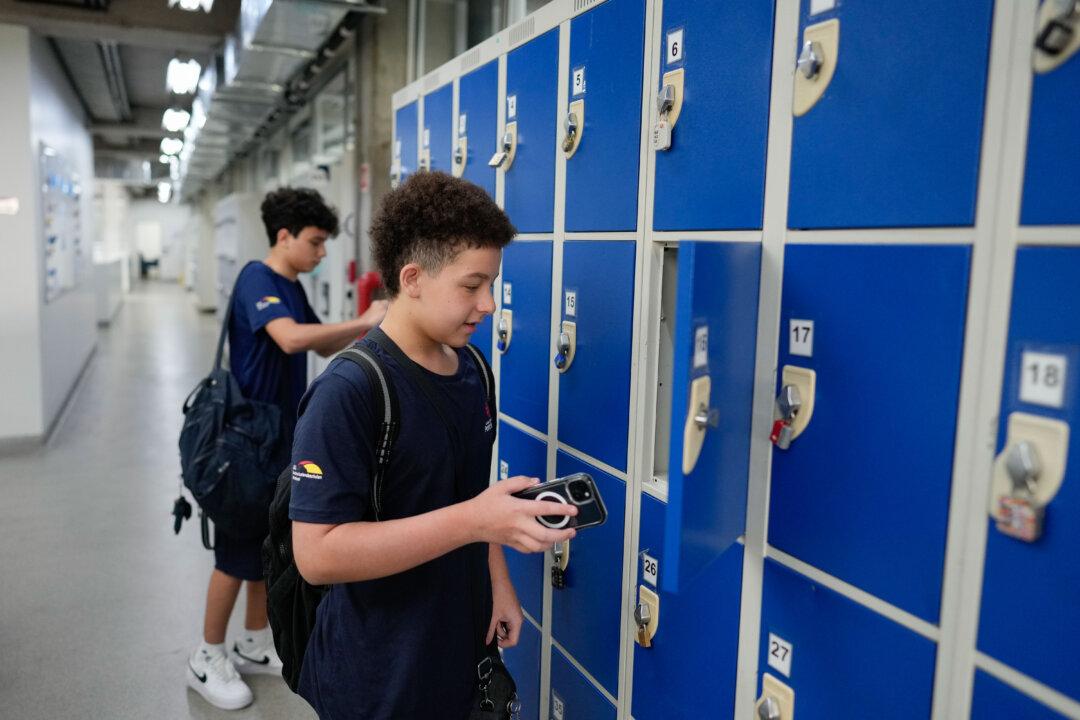Last month, Brazilian President Luiz Inácio Lula da Silva signed a new federal law which applies in all 26 of the country’s states, limiting smartphone access at schools, echoing decisions taken in Florida, Louisiana, South Carolina, and several European countries.
The legislation, which came into effect at the beginning of the school term—either Feb. 6 or Feb. 10, depending on the state—applies to the classrooms and hallways of public and private schools, and includes recess.
But schools can set their own rules as to whether phones can be kept in students’ backpacks, or stored in lockers or specially designated baskets.
An exception to the law is when phones are needed for educational purposes, with the teacher’s permission, or for certain students with accessibility and health issues.
Even before the law was introduced most of Brazil’s states, including Rio de Janeiro, Maranhao, and Goias, had already introduced restrictions on phone use in schools.
A survey last year by the Brazilian Internet Steering Committee found that in 2023, more than 60 percent of Brazilian schools had some form of restrictions and 28 percent had a complete ban.
But administrators struggled with enforcement in the absence of a national law.
In a statement on Feb. 10, Brazil’s Ministry of Education said the restriction was designed to protect students’ mental and physical health, while promoting the use of technology.
Efforts to ban smartphones from the classroom appear to have the support of both the left and the right in Brazil.
The country is polarized between supporters of Lula, who is a leftist, and the conservative former President Jair Bolsonaro, who Lula narrowly defeated in an election in October 2022.
A survey published in October 2024 by Brazilian pollster Datafolha said almost two-thirds of respondents wanted to ban smartphone use by children and teenagers at schools.
More than three-quarters of respondents said they felt smartphones did more harm than good to their children.
Students ‘Having Trouble Concentrating’
Meire Nocito, the principal of Porto Seguro, a 150-year-old private school in Sao Paolo, told The Associated Press: “Students were having trouble concentrating.“There was also the issue of social isolation. Many students who used technology excessively would isolate themselves during breaks, interacting only through social media.”
Porto Seguro prohibited smartphones in class last year, and encouraged students to switch off their devices completely once a week.
This year, it expanded the ban to include the school’s hallways, requiring students to keep their phones in their lockers for the entire school day, including recess.
“Banning cellphone use has helped create a space for social interaction, fostering relationships and teaching students to navigate conflicts, which are a natural part of human interactions,“ Nocito said. ”It has been very positive.”
Mariana Waetge, a 13-year-old student at Porto Seguro, said some children, “who didn’t have many friends ... would use their phones to hide from making new friends or to avoid being out there.”
“Now they don’t have that option anymore. These people end up playing board games or reading books,” she told AP.
Cell phone bans have become increasingly popular across the United States, where eight states have passed laws or policies banning or restricting cellphone use.
Growing Trend Globally
France has a ban in place on smartphones in schools for children aged 6 to 15.Australian Prime Minister Anthony Albanese in September 2024 said, “We want to see kids off their devices and onto footy fields and netball courts. Kids should be having real experiences with real people.”
Last year, China also introduced limits on children’s use of smartphones.
A report published in September 2024 by UNESCO said one in four countries had restricted smartphone use in schools.
Last year, Meta CEO Mark Zuckerberg apologized at a U.S. Senate hearing to the parents of children who had been exploited, bullied, or driven to self-harm via social media.
He said Meta had invested in “industrywide” efforts to protect children.





